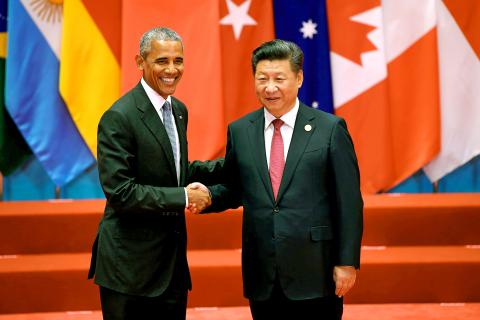US President Barack Obama on Saturday pressed his Chinese counterpart, Xi Jinping (習近平), on territorial disputes in the South China Sea, urging Beijing to uphold its legal obligations and stressing the US’ commitments to its regional allies.
Xi said China would continue to safeguard its sovereignty and maritime rights in the South China Sea, according to a statement on the Chinese Ministry of Foreign Affairs’ Web site.
The two leaders and their delegations met for more than four hours before Obama and Xi talked one-on-one.

Photo: Reuters
After the meetings with Xi and his top officials, Obama emphasized the importance for China to “abide by its obligations” to an international maritime treaty in the dispute over rights to a territory rich in oil and fish through which US$5 trillion in trade travels each year.
The Permanent Court of Arbitration in The Hague, Netherlands, in July ruled that China had no historic claim over the waters of the South China Sea and had infringed on the rights of the Philippines, which brought the case under the UN Convention on the Law of the Sea.
Xi said in his talks with Obama that China “will persist in peacefully resolving disputes through consultations with parties directly involved.”
He urged the US to “play a constructive role” in the peace and stability of the region.
In an unusually lengthy statement following the meeting, the White House said Obama had “underscored the United States’ unwavering commitment to the security of its treaty allies.”
“The president reaffirmed that the United States will work with all countries in the region to uphold the principles of international law, unimpeded lawful commerce, and freedom of navigation and overflight,” the White House said.
China’s foreign ministry, in a separate statement, said the US should drop its “double standards on the South China Sea” and play a constructive role in maintaining regional peace and stability.
Obama stressed the need for a “an open trade and investment environment” and “the need for China to protect religious freedom for all of its citizens,” the White House said.
China rejects criticism of its human rights record, arguing it has lifted millions out of poverty.
Cyber issues, from concern over hacking and cyberespionage to emerging Chinese policies on information technology, have also strained ties.

US PUBLICATION: The results indicated a change in attitude after a 2023 survey showed 55 percent supported full-scale war to achieve unification, the report said More than half of Chinese were against the use of force to unify with Taiwan under any circumstances, a survey conducted by the Atlanta, Georgia-based Carter Center and Emory University found. The survey results, which were released on Wednesday in a report titled “Sovereignty, Security, & US-China Relations: Chinese Public Opinion,” showed that 55.1 percent of respondents agreed or somewhat agreed that “the Taiwan problem should not be resolved using force under any circumstances,” while 24.5 percent “strongly” or “somewhat” disagreed with the statement. The results indicated a change in attitude after a survey published in “Assessing Public Support for (Non)Peaceful Unification

The CIA has a message for Chinese government officials worried about their place in Chinese President Xi Jinping’s (習近平) government: Come work with us. The agency released two Mandarin-language videos on social media on Thursday inviting disgruntled officials to contact the CIA. The recruitment videos posted on YouTube and X racked up more than 5 million views combined in their first day. The outreach comes as CIA Director John Ratcliffe has vowed to boost the agency’s use of intelligence from human sources and its focus on China, which has recently targeted US officials with its own espionage operations. The videos are “aimed at

SHIFT: Taiwan’s better-than-expected first-quarter GDP and signs of weakness in the US have driven global capital back to emerging markets, the central bank head said The central bank yesterday blamed market speculation for the steep rise in the local currency, and urged exporters and financial institutions to stay calm and stop panic sell-offs to avoid hurting their own profitability. The nation’s top monetary policymaker said that it would step in, if necessary, to maintain order and stability in the foreign exchange market. The remarks came as the NT dollar yesterday closed up NT$0.919 to NT$30.145 against the US dollar in Taipei trading, after rising as high as NT$29.59 in intraday trading. The local currency has surged 5.85 percent against the greenback over the past two sessions, central

STEADFAST FRIEND: The bills encourage increased Taiwan-US engagement and address China’s distortion of UN Resolution 2758 to isolate Taiwan internationally The Presidential Office yesterday thanked the US House of Representatives for unanimously passing two Taiwan-related bills highlighting its solid support for Taiwan’s democracy and global participation, and for deepening bilateral relations. One of the bills, the Taiwan Assurance Implementation Act, requires the US Department of State to periodically review its guidelines for engagement with Taiwan, and report to the US Congress on the guidelines and plans to lift self-imposed limitations on US-Taiwan engagement. The other bill is the Taiwan International Solidarity Act, which clarifies that UN Resolution 2758 does not address the issue of the representation of Taiwan or its people in